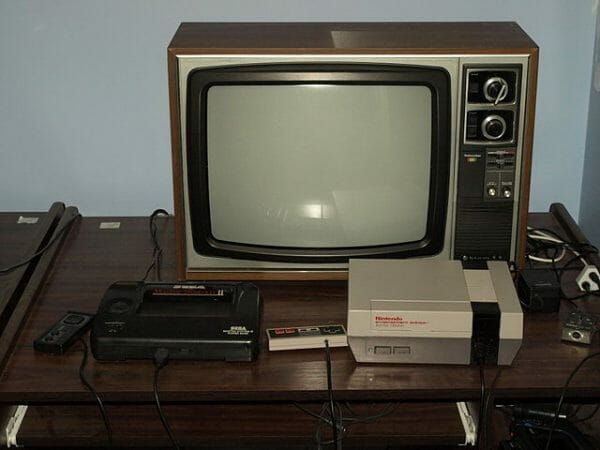Are you looking for a career in game development? If so, then you’ve come to the right place to learn about video game companies and your opportunities.
Well, the video game industry is looking to hire. Whether you’re a programmer, artist, writer, marketer, or gamer, you can find work in the industry. Video game companies are constantly springing up, and new game projects are hiring talented individuals to bring them to life. Truly, there are many options for pursuing a game development career. However, that also means there are MANY options – so which video game companies should you know about?
In this article, we’re going to be looking at some of the biggest video game companies, their history, and what they’ve done (i.e. their top games). Some of them you’ve probably heard of, others may be a bit more obscure. In any case, these video game companies are ones you should at least know about if you’re seriously looking to start your game development career. With that said, let’s jump right in and learn about the biggest video game companies.
Table of contents
Video Game Publishers vs. Video Game Developers
Before we dive in and talk about the top game studios, we need to address a quick elephant in the room: video game publishers vs. video game developers.
While a vast oversimplification (as with all things in life, it’s complicated), this is the main difference between the two types of video game companies:
- Developers mainly focus on building the actual game itself. This means programming, putting the assets together to make a cohesive product, testing, and everything that requires you to put your STEM knowledge to the test. You’ll often hear video game development companies referred to as “game studios” interchangeably.
- Publishers are focused more on the logistical business side of things. They’ll work on things such as obtaining actual financial investments for the game projects, marketing, getting the finished game to actual customers, and general project oversight to make sure the game actually gets finished in the first place by the deadline.
Again, though, this is oversimplifying things a lot. Many of the largest video game companies will function both as the developer and the publisher. So where the line between the two branches of the company is, is hard to pick out.
Indie game companies often get 3rd party publishers the larger their studios become. On the other end of the spectrum, though, some of the most famous game developers in the indie space literally started doing everything solo and continue to do so for the most part.
Inevitably, it is all relative to each individual situation. Regardless, for our list of best game companies, we’ll be focused from the best video game developers lens. Still, don’t be surprised to find companies here that function as both.
How to Get a Job at a Video Game Company
If you’re as passionate about pixels, game loops and questlines as we are, then kickstarting a career in one of the biggest video game companies might be your dream come true. But how do you get a foot in the door in this highly competitive industry? Do you need a degree in computer science or is a portfolio of modded games enough? To help you navigate this often convoluted path, we have collated some of the best resources, both from Zenva and from other credible sources, to help you land that dream job in your ideal game company.
There’s no one-size-fits all answer to landing a job at a game company, but there are some common traits and qualifications that can enhance your chances:
- Educational Background: A degree in computer science, game development, or a related field is often a prerequisite. However, there are exceptions to this rule for non-technical roles or for candidates with significant relevant experience.
- Portfolio: Whether you’re an artist, a programmer, or a designer, having a collection of work that showcases your skills is crucial. This could be university projects, hobbyist games, or professional work.
- Experience: internships, work placements or relevant entry-level jobs can help you gain practical experience in the industry.
- Network: Networking events, online communities and industry conferences are great platforms to connect with others in the sector and learn about potential job opportunities.
Remember, landing your dream job in a gaming company is no easy feat, but with commitment, creativity, and resourcefulness, the odds might well be in your favor.
To help you navigate this often convoluted path, we have collated some of the best resources to help you land that dream job in your ideal game company.
Unity Certification Preparations
One of the few industry-recognized credentials, Unity Certifications offer a guided pathway to success when it comes to your career. By preparing and obtaining these certifications, you’ll gain all the skills with Unity that you might need, and have the proof to show that. A key to add to your resume, there are plenty of options to prepare for them, including:
- Zenva’s Unity Associate Programmer Certification Pathway is a comprehensive course offering that prepares you for this respected industry certification. This Mini-Degree hones crucial skills such as C# programming, UI, asset management, and debugging, making you a stronger candidate for any Unity-powered game development role.
- The Unity Associate Game Developer Certification Pathway by Zenva is a meticulously structured Mini-Degree that prepares you for the official Unity exam while teaching you the ropes of game development with Unity. This resource not only enhances your employability but also your capacity to develop varied gaming projects, making it an invaluable investment as you navigate your career in game development.
Additional Information
Below we’ve also added some resources on game development in general, and some of the other skills you’ll need to prepare to enter a career.
- What is a Game Developer? Joining the Industry
- Becoming a Game Coder: Career Outlook
- The Guide to Game Art and Game Art Careers
- What is Game Design? Critical Skills for Video Games
- A Guide to Building a Game Developer Portfolio
- Best Game Developer Job Interview Questions Resources
- Best Game Design Job Interview Questions Resources
- Best Unity Job Interview Questions Resources
Epic Games: North Carolina, USA
Founded in 1991 by Tim Sweeny, Epic Games is a well-recognized AAA game development company. Originally named “Potomac Computer Systems,” its name was changed to “Epic MegaGames” in 1991 with the release of their first MS-DOS game, “ZZT.” Since 1991, Epic Games has gone on to produce 60 other video game titles with some of their most recognizable being Gears of War and Fortnite.
Epic Games is also known in the developing community as the creators of the Unreal Engine, a powerful, publicly-available game engine. They are also a parent company to Chair Entertainment, Psyonix, and Mediatonic – game development companies responsible for other titles like Rocket League and Infinity Blade.
Notable Video Games
- Infinity Blade
- Gears of War
- Fortnite
- Rocket League

Riot Games: California, USA
Riot Games has a prominent position not only in the game development industry but also in adjacent fields such as esports. Founded in 2006 by Brandon Beck and Marc Merill, the very first game produced by the company was League of Legends for PC and Mac. After the release of League of Legends in 2009, Riot Games opted to develop and monetize the game instead of starting a brand new project. This continued development included setting up an esports league for League of Legends.
In 2011, Riot Games was bought by Tencent Holdings Ltd. Between 2013 and 2016, League of Legends was the most-played PC multiplayer game in the world with monthly player counts reaching 100 million.
Notable Video Games
- Valorant
- League of Legends
Nintendo: Kyoto, Japan
Nintendo is the oldest video game company in existence. In 1889, Fusajiro Yamauchi founded Nintendo Karuta, a company that produced playing cards – long before it became one of the household game brands.
Nintendo was also one of the earliest developers of the video game console. Their first console, titled “The Color-TV,” was released in 1977. Nintendo weathered a recession in the video game industry during the 1980s with the release of the iconic games The Super Mario Brothers and Legend of Zelda. A new console was released during that time as well, the Nintendo Entertainment System.
The console put out by this Japanese company has gone through several evolutions resulting in the Nintendo Switch of recent times.
Notable Video Games
- The Super Mario Brothers
- The Legend of Zelda
- Pokemon
- Super Smash Bros
- Metroid
- Animal Crossing

Konami: Tokyo, Japan
Konami was founded in 1969 by Kagemasa Kōzuki, but it wasn’t until 1978 that they stepped into one of the AAA game companies. From 1978 to 1991, Konami produced arcade games such as Frogger and Metal Gear. They also published games on the Nintendo Entertainment System and home computers during that time. In 1991, their name was changed from Konami Industry Co. to simply Konami Co. Ltd. In the subsequent decade, Konami grew, expanding into the newly released Playstation and into card games with the release of their Yu-Gi-Oh! collectible cards.
In recent times, Konami is the name of the corporate conglomerate with their video game division being called “Konami Digital Entertainment.”
Notable Video Games
- Frogger
- Scramble
- Dance Dance Revolution
- Metal Gear
Sega: Tokyo, Japan
Sega Enterprises was formed in 1965. A photo booth company called Rosen Enterprises was acquired by Nihon Goraku Bussan in 1965 who changed the company’s name to Sega Enterprises. After the name change, the company began exclusively selling arcade games like pinball machines or arcade shooters.
In 1983, Sega released their first console called the SG-1000. The console did well in its first few years but ultimately didn’t become as popular as what Sega is known for today: their successful games. Sonic the Hedgehog was a character and a video game released in 1991 that was originally developed to showcase Sega’s new console called the Genesis. Sega’s success in the video game industry is typified by Sonic the Hedgehog, one of the best-selling video game franchises of all time.
Notable Video Games
- Sonic the Hedgehog
- Dragon Force
- Golden Axe
- Kingdom Conquest

Valve: Washington, USA
Which came first, Valve as a video game publisher or Valve as a video game developer? The answer is Valve as a video game developer but they both occur very near to each other. In 1996, Valve Corporation was founded in Kirkland, Washington by two former Microsoft employees, Gabe Newell and Mike Harrington. Two years later, Valve would release their first game called Half-Life.
Five years later, Valve would release the publishing platform Steam with a sequel to the first Half-Life game being released a year later. They are now a multi-billion dollar publishing and development company with several hit releases like Counter-Strike and Team Fortress.
Notable Video Games
- Half-Life
- Counter-Strike
- Team Fortress
- Dota
- Portal

HalfBrick Studios: Brisbane, Australia
Halfbrick Studios was founded in 2001 and focused almost exclusively on making licensed games for consoles and mobile devices. Their early work was often video game adaptations of TV series produced for non-video game companies like Nickelodeon. Halfbrick is mostly known for their wildly popular mobile games like Jet Pack Joyride and Fruit Ninja released in the early 2010s. Those two franchises were further developed by Halfbrick to include support for consoles and virtual reality.
Even with several hit titles under their belt, Halfbrick is considered an indie company employing between 50-200 people.
Notable Video Games
- Jet Pack Joyride
- Fruit Ninja
- Dan The Man
- Battle Racing Stars
- Monster Dash
Square Enix: Tokyo, Japan
The origin of the company Square Enix centers around a merger in 2003 between the two Japanese video game companies “Square” and “Enix.” Square was founded in 1983 as a software division of a Japanese power line construction company. In 1987, Square published what would become their most popular role-playing game called Final Fantasy.
Enix was founded in 1975 and was focused on both developing and publishing games for the consoles at the time. Enix was responsible for publishing the wildly popular Dragon Quest series, presenting Enix and Square as prominent competitors. In 2003, both video game companies announced the merger which brought several popular game titles together under one company.
Notable Video Games
- Final Fantasy
- Dragon Quest
- Kingdom Hearts
- Chrono Trigger
- Tomb Raider
Coffee Stain Studios: Skövde, Sweeden
Coffee Stain Studios is one of the more recent video game companies on this list. It was founded by students at the University of Skövde in 2010 as many indie game companies start. Coffee Stain Studios published their first game, I Love Strawberries, that same year on the Apple App Store. They found early success by winning a modding competition put on by Epic Games. Their mod, called Sanctum, combined the genres of “tower defense game” and “first-person shooter.” It was released as a standalone game in 2011.
The game that rocketed the company into the spotlight and turned it into a successful video game brand was Goat Simulator, released in 2014 and generating over 10 million dollars worth of revenue by the end of 2016. In addition to Goat Simulator, Coffee Stain Studios published Satisfactory, a simulation game released near the beginning of 2019. Satisfactory garnered half a million users in its first three months of release, passing one million within a year.
Notable Video Games
- Sanctum
- Satisfactory
- Goat Simulator

Rockstar Games: New York City, USA
Rockstar Games Incorporated was formed in 1998 under the parent company “Take-Two Interactive.” Before forming Rockstar Games, Take-Two Interactive had acquired several properties from the British game development company BMG Interactive. The game Grand Theft Auto was among the properties acquired by Take-Two Interactive.
Once the acquisition had been made, three employees from BMG Interactive went to work for Take-Two Interactive. These three employees, Sam Houser, Dan Houser, and Jamie King, founded Rockstar Games Inc. as a subsidiary of Take-Two Interactive. Rockstar Games would then go on to produce over 100 more video game titles with some of them being among the bestselling video games of all time.
Notable Video Games
- Grand Theft Auto V
- Red Dead Redemption
- Max Payne
Noodlecake Studios: Saskatchewan, Canada
Not all game development companies need to be focused on publishing to every game platform in existence. Founded in 2011, Noodlecake Studios found a niche in the mobile game arena. Their first game, Super Stickman Golf, was also published in 2011 and has over five million downloads on the Google Play Store. Several of their games gained editor’s recommendations on the Apple App Store.
In addition to being a developer, Noodlecake is also an indie publisher. Some of the games published by Noodlecake include Alto’s Odyssey, Chameleon Run, and Getting Over It With Benny Foddy – all three of which were top of the charts in both Google Play and Apple App Store.
Notable Video Games
- Alto’s Odyssey
- Absolute Drift
- Getting Over It with Benny Foddy
- Flipping Legend
- Bouncy Hoops
- Chameleon Run
- Super Stickman Golf

Unknown Worlds Entertainment: California, USA
Charlie Cleveland founded Unknown Worlds Entertainment in 2001. Their first game started life as a mod for Half-Life called Natural Selection. The mod was so successful the developers planned a sequel and Unknown Worlds Entertainment was born. The sequel to Natural Selection was released in 2012 titled Natural Selection 2.
Unknown Worlds then went to work on their next project called Subnautica that was eventually released in early access in 2014. The full release came out in 2018 and immediately received critical acclaim, selling five million copies in two years. Unknown Worlds then planned a sequel to Subnautica that was released in 2021. The sequel, titled Subnautica: Below Zero, also received critical acclaim for its captivating design, gameplay, and story.
Notable Video Games
- Natural Selection
- Zen of Sudoku
- Subnautica
- Subnautica: Below Zero
Naughty Dog: California, USA
Andy Gavin and Jason Rubin created Naughty Dog in 1989. At the time, Gavin and Rubin had been working together as game developers for JAM Software (a company they founded in 1984) and decided to change the name to “Naughty Dog.” The release of their 1994 game Way of the Warrior prompted Universal Interactive Studios to sign a deal with Naughty Dog that would result in the 1996 release of the game Crash Bandicoot. The game was so successful that three more Crash Bandicoot games were eventually developed.
During the 2000s, Naughty Dog continued to grow its game library with prominent titles like Uncharted and The Last of Us. Naughty Dog’s games have received critical acclaim with the video game studio even being named “Studio of the Year” in 2013 by VGX for their gaming world accomplishments.
Notable Video Games
- Way of the Warrior
- Crash Bandicoot
- Uncharted
- The Last of Us

Mojang: Stockholm, Sweden
Markus “Notch” Persson founded the company “Mojang Specifications” in 2009. The first game put out by Mojang was Minecraft and it came out that same year. In a little over two years, Minecraft’s popularity skyrocketed to over 10 million registered accounts. The rest of Minecraft’s history is fairly well known with the game becoming the best-selling video game of all time in 2019, reaching a total of 238 million accounts created.
In 2014, Mojang was bought by Microsoft but still maintained its headquarters in Sweden. After the acquisition, Persson stepped down as Mojang’s CEO and Jens Bergensten took the role that year. In addition to continuing development of Minecraft, Mojang also put out a few more games. Their game Crown and Council is a turn-based strategy game and was released in 2016. Originally called Scrolls, Mojang also released Caller’s Bane, a strategy card game, in 2018.
Notable Video Games
- Minecraft
- Minecraft Dungeons
- Caller’s Bane
- Crown and Council
Activision Blizzard: California, USA
Bobby Kotik became CEO of a company called “Mediatonic” in 1990. The following year, he changed the company’s name from “Mediatonic” to “Activision.” During the decade, Activision began acquiring several gaming studios and their associated video games. The biggest acquisition deal Activision made was actually a merger deal in 2008 between Activision and the French company Vivendi Games. Vivendi Games was the parent company of “Blizzard Entertainment” and, following the merger deal, the company was renamed “Activision Blizzard.”
At the time, Activision had published hundreds of video games including the Call of Duty franchise. Following the deal, Activision Blizzard became the 5th largest video game producer in the world publishing AAA games such as Overwatch and Destiny 2.
Notable Video Games
- Starcraft
- Call of Duty
- Guitar Hero
- Overwatch
- World of Warcraft
- Diablo
- Hearthstone
Ending Words About Video Game Companies
We’ve covered a lot of video game companies here, but this is by no means an exhaustive list. There are many more video game companies throughout the world of various sizes and work cultures, so we definitely recommend putting in your research before applying anywhere.
This is especially the case if you’re looking for non-American companies in places like the European video game market or are looking for video game publishers (such as Electronic Arts or Sony Computer Entertainment). Maybe you want something closer to home, or maybe you’re looking for a startup to help grow with a small team. Maybe you even want to consider starting your own company someday and take the gaming industry by storm.
Regardless, this is just one step in the game development career. We recommend also checking out our game developer career guide, upskilling in things like coding with sites like Zenva, as well as setting up a portfolio to showcase your work. You may also want to learn about the differences between handheld games, mobile platforms, console games, online games, and so forth, as this is actually an area that can lead to specialization that changes what video game companies you should even care about.
Lastly, you can also jumpstart your career by checking out certifications. As mentioned, through Zenva’s Unity Associate Programmer Certification Pathway and Unity Associate Game Developer Certificate Pathway, you can learn everything you need to know to pass those exams and add an industry-recognized credential to your arsenal.
Starting a career takes work, so we wish you the best of luck with your future game dev careers – no matter which video game company you wind up working for.
Did you come across any errors in this tutorial? Please let us know by completing this form and we’ll look into it!

FINAL DAYS: Unlock coding courses in Unity, Godot, Unreal, Python and more.







